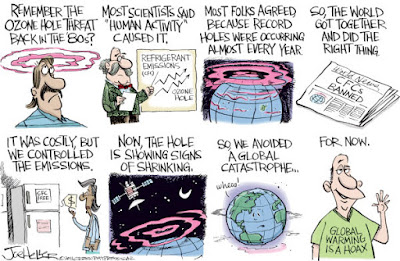In
this blog entry I’ve decided to take a more formal approach to presenting the
domestic dilemmas of climate change and provide you an insight into how academics
of the world are approaching the issue.
Focusing
on the Energy Policy article ‘Willingness-to-pay
and policy-instrument choice for climate-change policy in the United States’
by Kotchen et al (2013), I wish
to draw your attention to a key method US policymakers deploy to measure the
support of the public in their efforts to reduce GHG emissions 17% by 2020.
A willingness-to-pay
(WTP) survey.
Yes, a survey. Disseminated by
household and undertaken by American adults.
Now, you may be thinking that
a survey is too simple a method in relation to the very real and global issue
of climate change, however policymakers are turning to WTPs more and more in
order to 'provide an economic justification for controlling domestic GHG emissions' and to highlight
how important it is to communicate policy instrument choices i.e.
“cap-and-trade” system and carbon tax (Kotchen
et al., 2013).
Examples of WTP Survey Questions 2010-2011 (Kotchen et al., 2013)
In
my opinion, this is an interesting way of engaging us, the public, with current
climate-change debates and encouraging domestic contribution to GHG reduction.
It also means that we are directly involved with enabling the success of GHG
reduction policies and are not side-lined. For example, Kotchen et al (2013)
state:
“American households have an average annual WTP of $79 for cap-and-trade,
$85 for a carbon tax, and $89 for a GHG regulation, all of which are in support
a 17-percent reduction in domestic emissions by 2020. These estimates
contradict the frequently made argument that the costs of climate change
policies are grossly disproportionate to the benefits.”
However,
I have to raise the issue that surveys aren’t concrete nor legalised documents.
People’s opinions are subject to change, in fact the answers they provide are
largely determined by their mood at the time and what they feel they “should”
write. Furthermore, the study highlights uncertainties driven by sociodemographic
characteristics which hinder the effectiveness of WTP estimates and their
practical application, with lack of belief in climate change, older,
less-educated individuals and large, low-income households generating “don’t know” answers.
So, I argue that WTP surveys are unrealistic and unreliable representations
of societal support for GHG reduction, and that to depend on the results they
generate could be dangerous investment.
That
said, I believe public inclusion and domestic contribution are crucial steps towards
achieving climate change mitigation. After all, we’re all responsible for our
own futures right?



No comments:
Post a Comment